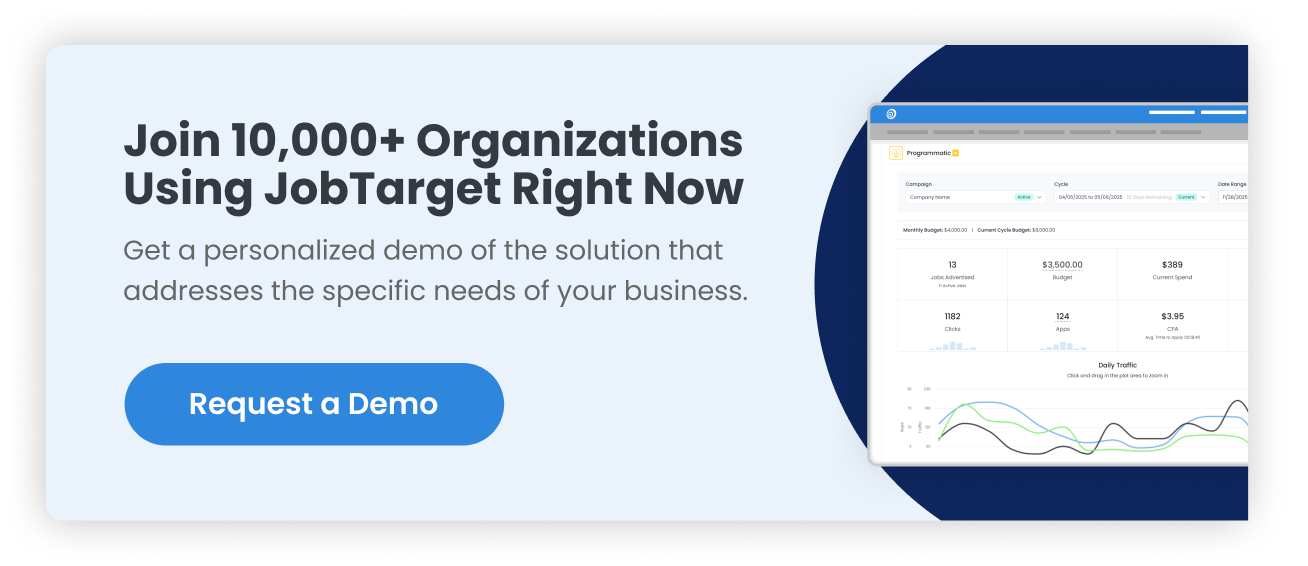Recruiting job seekers in a high-volume environment can be challenging for any organization. If it isn’t done correctly, you can receive too many applications from unqualified candidates and produce bad experiences for all parties involved – ultimately wasting time and money for your organization.
In a competitive market, coming up with an effective strategy and having the proper infrastructure in place for mass hiring is critical for success.
High Volume Recruitment Defined
High-volume recruiting is a strategy that organizations deploy when they must hire multiple open positions quickly. Companies can also use the process when they have one position but want to receive a vast number of applications quickly. Most organizations will use high-volume recruiting tactics when several positions are open due to company growth, high employee turnover, or when seasonal employment is commonplace.
Regular recruiting processes typically focus on hiring a few positions at a time. The recruiter follows a manual process for posting and advertising the role. They conduct in-depth interviews and allow time for proper candidate vetting before making a final hiring decision.
On the other hand, high-volume recruiting relies on the speed and accuracy of hiring several similar positions at one time by leveraging automation and artificial intelligence. This allows recruiters to automatically post job descriptions across several websites quickly and match the skills required based on relevant data -reducing candidate vetting time and increasing hiring productivity.
Questions to Ask Before Recruiting at High Volume
-
When recruiting candidates at high volume, there are several factors to ask yourself:
-
Will your team have the time to field a large number of applications?
-
Are you able to analyze, organize, and track each component of the hiring process?
-
Do you know what your brand reputation is and how it’s reflected on social media?
-
Does your organization have an applicant tracking system or human resources information system in place?
How to Approach High Volume Recruiting
Planning is key to high volume recruiting and it takes a lot of it. Knowing that you’ll have a mass number of applications to evaluate, you should have a clearly built-out candidate profile that meets your organization’s requirements and the descriptions in the positions to reflect that. By doing so, you’ll make your screening process much easier.
Save Time Recruiting Through Automation
When time is a factor, a great practice for speeding up your hiring efficiency is to automate your job postings with programmatic job advertising. This performance-based tool uses algorithms to place your roles on job sites where they would be most effective–maximizing your budget and of course, saving you time.
Other ideal ways to automate efficiencies when you’re looking to fill a large number of candidates for similar roles include:
-
Using AI-powered software for collecting data and matching skills with job descriptions
-
Implementing easy application processes, automated responses, and tracking measures
-
Having candidate self-interview scheduling and pre-hire skills evaluations such as judgment and personality tests and multi-tasking assessments
Along with these factors, you may want to create a talent pipeline based on referrals and previously qualified candidates. You’ll also want to reflect on how you and your team have treated candidates who weren’t hired for an open position but could be a good fit for something in the future. These would be helpful tactics for sourcing at a high volume.
Advanced Technology Makes Everything Easier
When searching for a high volume of candidates within a short time period, it would be beneficial to have the latest technology at your fingertips. In a perfect world, it would benefit your organization by implementing an Application Tracking System (ATS), Human Resources Information System (HRIS), and use programmatic advertising solutions. However, the type of system(s) you implement depends on the budget and size of your organization.
Here’s a quick overview of systems for faster recruitment:
-
ATS systems focus on attracting candidates and keeping track of several stages of the hiring process. This includes the marketing and posting of multiple job ads across several websites. It collects and stores candidate data and measures a candidate’s skills against an open position’s job description.
-
HRIS systems focus on the tracking of employee information after they are hired. This includes benefits, contact information, position details, salary, and paid time off. It also supports the onboarding and offboarding of employees, and any related or required training.
-
Programmatic advertising is an automated solution used for real-time buying and selling of online advertising. Its machine learning algorithms evaluate the performance of your job advertisements and determine where they should go to be the most effective based on user behaviors and other data.
Adapting to the latest technology will help your organization scale your hiring process and reduce your time-to-hire and cost per applicant. The technology also reduces any manual processes that you have in place and allows you and your team to spend time on projects requiring a human element.
Conclusion
High-volume recruiting can be quite successful when using automated resources. You’ll not only be able to fill your open roles faster, but you’ll also be able to customize each candidate's experience, be able to handle numerous applications, and track and measure your results better. All these measures lead to you getting back the time you deserve to focus on more detailed projects.
JobTarget provides its own automated programmatic advertising solution designed to get job postings in front of the right audiences efficiently. If you manage job postings manually, programmatic job advertising can transform how you source candidates. Click below to contact us.








